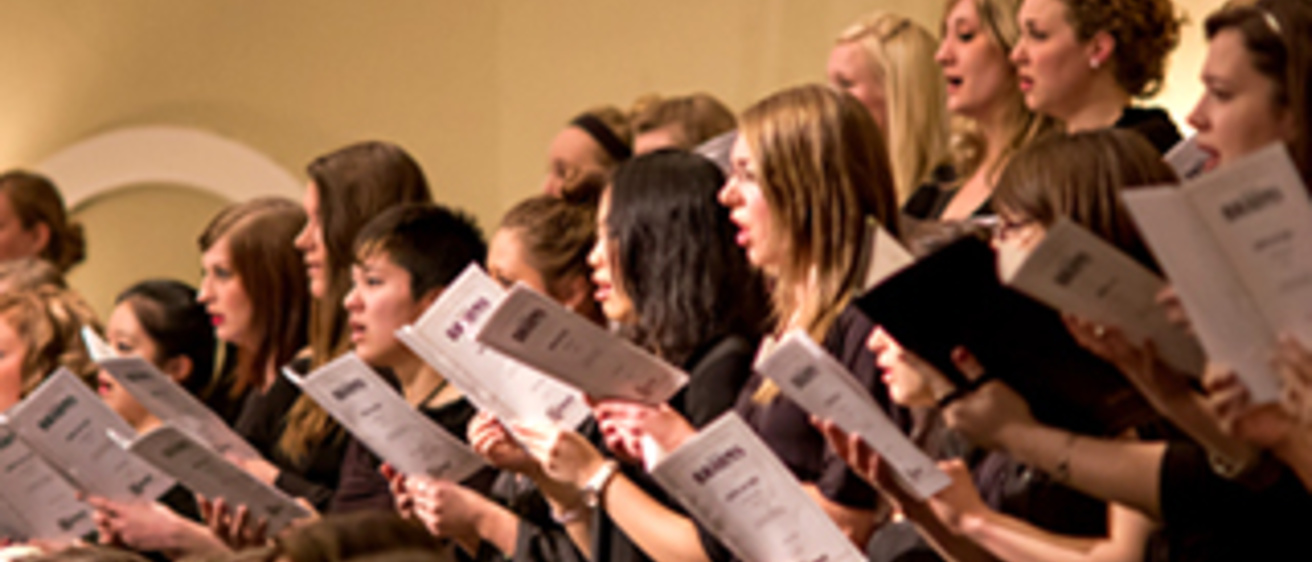The University of Iowa School of Music will live stream the March 4 Kantorei and University Choir performance, beginning at 7:25 p.m. CST.
* This live stream is Flash-based and is not compatible with all mobile devices.
Kantorei is the premier choral ensemble of the University of Iowa, consisting of about 30 graduate students. Kantorei presents four to five concerts on campus each year, as well as a number of off-campus performances.
University Choir is a select, advanced choir of 50–60 singers, primarily undergraduate students. They present four to five concerts per year and also collaborate with the University Symphony Orchestra to perform two major works.
PROGRAM
UNIVERSITY CHOIR
I.
Aus der Tiefen rufe ich, Herr, zu dir (Cantata 131)
J. S. Bach (1685–1750)
1. "Aus der Tiefen" (choir)
2. "So du willst, Herr" (bass solo with sopranos)
3. "Ich harre des Herrn" (choir)
4. "Meine Seele wartet" (tenor solo with altos)
5. "Israel, hoffe auf den Herrn" (choir)
Taylor Mayne, tenor
Nicholas Miguel, bass
Dan Ellis, oboe
Andrew Gentzsch, violin
Tim Cuffman, viola I
Dana Mietus, viola II
Robert Hillman, bassoon
Ross Jallo, organ
Matthew Laughlin, cello
Rebecca Furtado, bass
II.
Three Folksongs
"The Old Mayflower" (from Songs of the Newfoundland Outports)
Harry Somers (1925–1999)
"Marianne" (from North Country Folksongs)
Philip Wilby (b. 1949)
Feller from Fortune (from Songs of the Newfoundland Outports)
Harry Somers (1925–1999)
INTERMISSION
KANTOREI
I.
The Sacred and Profane from the Renaissance
"Laudibus in sanctis" (from Cantiones Sacrae, 1591)
William Byrd (1543–1623)
Part I: "Laudibus in sanctis Dominum"
Part II: "Magnificum Domini"
Part III: "Hunc arguta canant"
"Construe my meaning"
Giles Farnaby (c. 1560–c. 1620)
"Fyer, fyer!"
Thomas Morley (1558–1603)
II.
Liebeslieder Walzer, Op. 52
Johannes Brahms (1833–1897)
I. "Rede, Mädchen, allzu liebes" (Russian)
II. "Am Gesteine rauscht die Flut" (Russian-Polish dance song)
III. "O die Frauen" (Russian-Polish dance song)
IV. "Wie des Abends schöne Röte" (Russian-Polish dance song)
V. "Die grüne Hopfenranke" (Russian)
VI. "Ein kleiner, hübscher Vogel" (Hungarian)
VII. "Wohl schön bewandt war es vorehe' (Polish)
Aurora DePaul, soprano
IX. "Am Donaustrande, da steht ein Haus" (Hungarian)
X. "O wie sanft die Quelle" (Russian-Polish dance song)
XI. "Nein, es ist nicht auszukommen" (Polish)
XII. "Schlosser auf, und mache Schlösser" (Russian-Polish dance song)
XIII. "Vögelein durchrauscht die Luft" (Russian-Polish dance song)
XIV. "Sieh, wie ist die Welle klar" (Russian-Polish dance song)
XV. "Nachtigall, sie singt so schön" (Russian-Polish dance song)
XVI. "Ein dunkeler Schacht ist Liebe" (Hungarian)
XVII. "Nicht wandle, mein Licht" (Hungarian)
Stephen Smith, tenor
XVIII. "Es bebet das Gesträuche" (Hungarian)
